
Environmental Health
Scope & Guideline
Exploring the Impact of Environment on Public Well-Being
Introduction
Aims and Scopes
- Epidemiological Research on Environmental Exposures:
The journal consistently publishes studies examining the links between environmental pollutants (like air pollution, heavy metals, and pesticides) and various health outcomes, utilizing robust epidemiological methodologies. - Impact of Chemical Exposures on Health:
There is a strong emphasis on the health effects of chemical exposures, including endocrine disruptors, persistent organic pollutants, and pharmaceuticals, with a focus on both prenatal and childhood exposures. - Systematic Reviews and Meta-Analyses:
The journal features numerous systematic reviews and meta-analyses that synthesize existing literature on environmental health topics, providing comprehensive insights into specific areas of research. - Community and Public Health Perspectives:
Research often addresses community-level impacts of environmental hazards, highlighting the importance of public health interventions and policies to mitigate risks associated with environmental exposures. - Interdisciplinary Approaches:
The journal encourages interdisciplinary research that combines environmental science, epidemiology, toxicology, and public health to address complex environmental health issues.
Trending and Emerging
- Mental Health Impacts of Environmental Exposures:
There is a rising focus on the links between environmental exposures, particularly air pollution, and mental health outcomes, indicating an expanding recognition of how environmental factors can affect psychological well-being. - Cumulative and Mixture Exposure Assessments:
Research increasingly emphasizes cumulative and mixture assessments of environmental exposures, recognizing that individuals are often simultaneously exposed to multiple pollutants and chemicals. - Climate Change and Health:
The journal is increasingly publishing studies addressing the health impacts of climate change, including extreme weather events and shifts in disease patterns, reflecting a growing concern for how environmental changes influence public health. - Community-Based Participatory Research:
There is a notable increase in community-based participatory research, which actively involves local communities in the research process to address environmental health disparities and improve health outcomes. - Emerging Contaminants and New Technologies:
Research on emerging contaminants, such as PFAS and microplastics, is gaining momentum, alongside studies exploring innovative technologies for exposure assessment and health impact evaluations.
Declining or Waning
- Traditional Industrial Pollutants:
Research focusing on traditional industrial pollutants such as asbestos and lead appears to be less frequent, possibly due to increased regulatory measures and a shift in focus towards newer environmental challenges. - Static Models of Risk Assessment:
There is a noticeable reduction in studies relying solely on static models for assessing environmental health risks, as the field increasingly embraces complex modeling approaches that consider multiple exposures and interactions. - Single Exposure Studies:
The journal has seen a decline in single-exposure studies, with a growing preference for research that examines the cumulative effects of multiple exposures, reflecting a more holistic understanding of environmental health.
Similar Journals
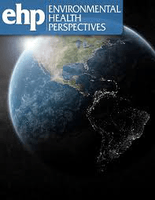
ENVIRONMENTAL HEALTH PERSPECTIVES
Exploring the critical links between our environment and well-being.Environmental Health Perspectives (EHP) is a premier open-access journal published by the U.S. Department of Health and Human Services, Public Health Science, dedicated to publishing rigorous and impactful research in the field of environmental health. Since its inception in 1972, EHP has become a leading platform for disseminating knowledge on the interactions between the environment and human health, making significant contributions to the fields of toxicology and public health. With an impressive impact factor and a Q1 ranking in both Health, Toxicology and Mutagenesis and Public Health, Environmental and Occupational Health categories, EHP ranks among the top journals globally, reflecting its high citation and visibility within the academic community. Researchers, professionals, and students alike will find a wealth of vital information within its pages, as EHP covers a wide array of topics related to environmental exposures, health outcomes, and policy implications. Furthermore, EHP engages with a global audience through its commitment to open access, ensuring that critical research is available to all, enhancing the collective understanding of environmental health issues since 1972.

Environnement Risques & Sante
Empowering Research for a Healthier PlanetEnvironnement Risques & Sante is a prominent journal focused on the intersection of environmental issues, public health, and safety, offering a platform for scholarly discourse on the critical challenges posed by environmental risks to human health. Published by JOHN LIBBEY EUROTEXT LTD, this journal aims to disseminate impactful research that enhances our understanding of toxicology, mutagenesis, and their implications for public health policy and practices. Though it ceased coverage in Scopus in 2021, its historical contributions remain relevant, addressing urgent topics in environmental science and occupational health. Researchers and professionals engaged in these fields will find valuable insights and findings that inform practice and promote sustainable solutions. For interested readers, further exploration of the journal can provide essential knowledge in coping with contemporary environmental health challenges.

ANNALI DELL ISTITUTO SUPERIORE DI SANITA
Pioneering insights in health and medicine since 1965.ANNALI DELL ISTITUTO SUPERIORE DI SANITA is a prestigious open-access journal established in 1965, published by the Istituto Superiore di Sanità in Italy. With an ISSN of 0021-2571 and an E-ISSN of 2384-8553, the journal provides a vital platform for disseminating high-quality research in the fields of medicine and public health. Recognized for its significant contributions, it holds a Q2 ranking in both Medicine (miscellaneous) and Public Health, Environmental and Occupational Health as of 2023, placing it in the 60th percentile in Scopus rankings. The journal is committed to advancing knowledge and practice through rigorous peer-reviewed articles, making it an essential resource for researchers, healthcare professionals, and students interested in contemporary health issues. Its commitment to open access since 2001 ensures that research findings are readily available, fostering collaboration and innovation in the global health community.
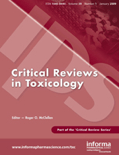
CRITICAL REVIEWS IN TOXICOLOGY
Elevating Understanding of Chemical Risks and ImpactsCRITICAL REVIEWS IN TOXICOLOGY, published by Taylor & Francis Ltd, stands as a preeminent journal within the field of toxicology, boasting an impressive Q1 ranking and holding the distinction of being ranked 12th out of 133 in the toxicology category according to Scopus, placing it in the top 91st percentile. With a continuous publication history since 1971 and a commitment to providing high-quality reviews, the journal offers critical insight into the latest research and advancements in toxicological sciences. While it is not an open-access journal, it provides numerous access options for both subscribers and institutions, ensuring that its extensive articles are widely available to the academic community. The journal's objectives are to disseminate comprehensive reviews that foster understanding and innovation in the assessment of chemical risks, environmental impacts, and the mechanisms of toxicity, making it an invaluable resource for researchers, professionals, and students dedicated to the science of toxicology.
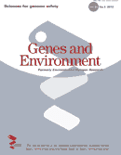
Genes and Environment
Transforming Research into Policy for Healthier FuturesGenes and Environment is a premier interdisciplinary journal published by BMC that explores the dynamic interplay between genetic factors and environmental influences shaping health and behavior. Since its inception, the journal has gained recognition for its commitment to providing open access (since 2015) to groundbreaking research, fostering an inclusive platform for scholars worldwide. With an ISSN of 1880-7046 and an E-ISSN of 1880-7062, Genes and Environment consistently ranks in Q2 in Environmental Science, Q3 in Genetics, and Q2 in Social Psychology according to the 2023 category quartiles, highlighting its significant contributions to these fields. The journal is headquartered in the United Kingdom and has a diverse portfolio of research spanning from 2006 to 2024. It is recognized in Scopus with commendable rankings across various disciplines. By fostering dialogue among researchers, professionals, and students, Genes and Environment serves as a vital resource for understanding complex biological interactions with environmental factors, ultimately aiming to advance knowledge and inform public policy.
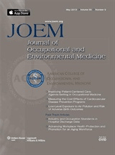
JOURNAL OF OCCUPATIONAL AND ENVIRONMENTAL MEDICINE
Advancing health at work and beyond.JOURNAL OF OCCUPATIONAL AND ENVIRONMENTAL MEDICINE, published by Lippincott Williams & Wilkins, is a premier journal dedicated to advancing the field of occupational and environmental health. With a rich history dating back to 1959 and a notable impact factor reflecting its relevance, the journal operates at the intersection of public health and environmental science, ranking in the Q2 category in the 2023 Scopus rankings within its field. It caters to a diverse audience of researchers, healthcare professionals, and students, providing a vital platform for peer-reviewed articles that address critical issues in occupational and environmental medicine. The journal’s mission is to disseminate innovative research findings and establish best practices that improve workplace safety and public health. With a focus on high-quality, evidence-based content, JOURNAL OF OCCUPATIONAL AND ENVIRONMENTAL MEDICINE plays a crucial role in shaping policy and fostering interdisciplinary collaboration among practitioners and scholars in the health sector.
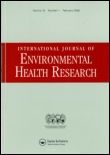
INTERNATIONAL JOURNAL OF ENVIRONMENTAL HEALTH RESEARCH
Exploring the Nexus of Environment and HealthINTERNATIONAL JOURNAL OF ENVIRONMENTAL HEALTH RESEARCH, published by Taylor & Francis Ltd, serves as a cornerstone for interdisciplinary research focusing on the crucial intersections of environmental science and public health since its inception in 1991. With an ISSN of 0960-3123 and an E-ISSN of 1369-1619, the journal spans diverse topics related to environmental health, toxicology, and pollution science, holding high ranks in 2023 such as Q2 in Pollution and Public Health, showcasing its vital contributions to the field. Researchers will appreciate its robust platform as it features rigorous peer-reviewed articles aimed at unveiling the complexities of human health in relation to environmental factors. While the journal maintains a traditional access model, it ensures broad dissemination of high-quality research works. As a reputable source for both emerging and established scholars, the International Journal of Environmental Health Research offers critical insights and advancements pivotal to fostering a healthier planet.

Exposure and Health
Advancing knowledge on environmental impacts to enhance public health.Exposure and Health is a pioneering journal published by Springer, specializing in the interdisciplinary fields of health, toxicology, and environmental sciences. With an ISSN of 2451-9766 and E-ISSN of 2451-9685, this open-access journal exemplifies a commitment to disseminating high-quality research that informs public health practices and policies globally. Situated in the Netherlands, it boasts an impressive impact factor and ranks in the top quartile (Q1) across multiple categories in the 2023 Scopus rankings, including Health, Toxicology and Mutagenesis, Pollution, and Water Science and Technology. The journal is dedicated to advancing knowledge on the interactions between environmental factors and health outcomes, making it a vital resource for researchers, professionals, and students in these critical fields. Exposure and Health actively encourages submissions that address the challenges of exposure assessment, risk management, and the promotion of sustainable public health initiatives.

Toxicology and Environmental Health Sciences
Advancing the Science of Environmental Health and ToxicologyToxicology and Environmental Health Sciences is a peer-reviewed journal published by the Korean Society for Environmental Risk Assessment & Health Science, dedicated to advancing the fields of toxicology and environmental health. With an ISSN of 2005-9752 and E-ISSN 2233-7784, this journal serves as a vital platform for researchers, professionals, and students seeking to explore the intricate relationships between environmental risks and public health. Operating from South Korea, it has a converged years span from 2009 to 2024, and currently holds a respectable Q3 quartile ranking in both Health, Toxicology and Mutagenesis and Toxicology. This positions the journal within a critical space for those invested in understanding and mitigating environmental health challenges. Although not an open-access journal, it continues to foster high-impact research, contributing to a better understanding of toxicological sciences and environmental health dynamics. Engage with the latest findings and discussions that shape this evolving field through the insightful articles published herein, reinforcing its importance as a resource for scholars and practitioners alike.
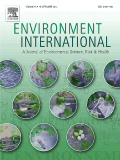
ENVIRONMENT INTERNATIONAL
Transforming Insights into Action for a Greener TomorrowENVIRONMENT INTERNATIONAL is a premier journal dedicated to advancing the field of environmental science. Published by PERGAMON-ELSEVIER SCIENCE LTD, it boasts an impressive impact factor and holds a prestigious Q1 classification in the Environmental Science category, reflecting its influence and reputation within academia. Since transitioning to Open Access in 2019, the journal has increased its accessibility, allowing a wider audience—from researchers to industry professionals—to engage with cutting-edge studies that address crucial environmental challenges. With a Scopus rank of #3 out of 233 in General Environmental Science and a commendable 98th percentile, ENVIRONMENT INTERNATIONAL is committed to publishing high-quality research that informs policy and practice. Covering a broad spectrum of topics from pollution and climate change to sustainable development, this journal serves as a vital resource for those dedicated to making a positive impact on our planet. For submissions, inquiries, or to explore its extensive archives dating from 1976 to 2024, please visit their site at the Kidlington, Oxford headquarters.